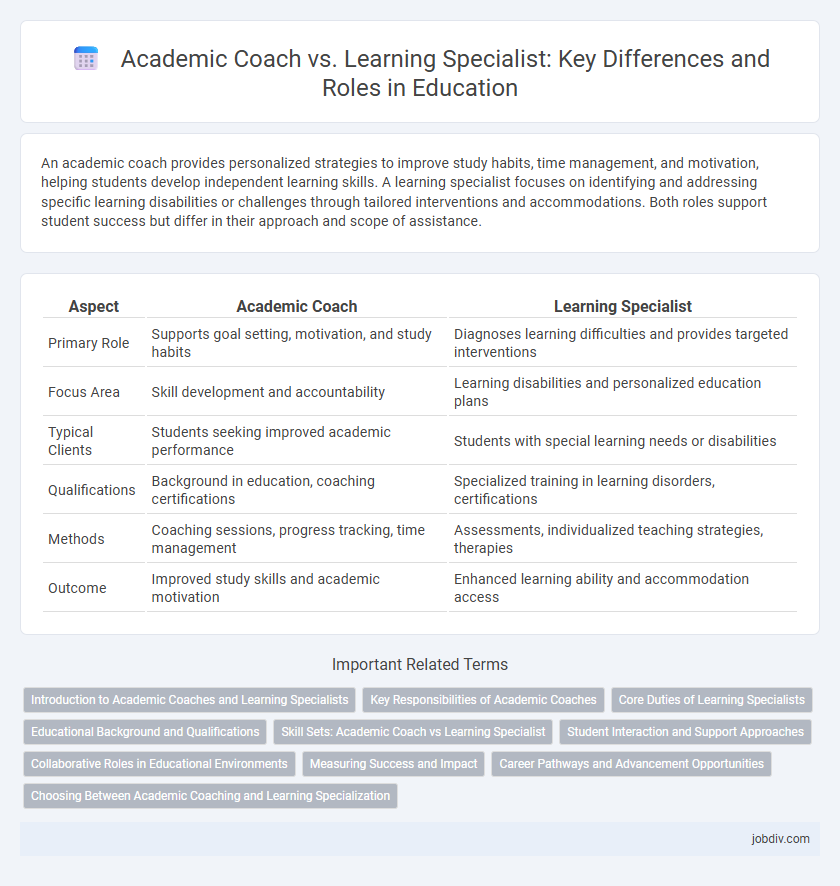An academic coach provides personalized strategies to improve study habits, time management, and motivation, helping students develop independent learning skills. A learning specialist focuses on identifying and addressing specific learning disabilities or challenges through tailored interventions and accommodations. Both roles support student success but differ in their approach and scope of assistance.
Table of Comparison
| Aspect | Academic Coach | Learning Specialist |
|---|---|---|
| Primary Role | Supports goal setting, motivation, and study habits | Diagnoses learning difficulties and provides targeted interventions |
| Focus Area | Skill development and accountability | Learning disabilities and personalized education plans |
| Typical Clients | Students seeking improved academic performance | Students with special learning needs or disabilities |
| Qualifications | Background in education, coaching certifications | Specialized training in learning disorders, certifications |
| Methods | Coaching sessions, progress tracking, time management | Assessments, individualized teaching strategies, therapies |
| Outcome | Improved study skills and academic motivation | Enhanced learning ability and accommodation access |
Introduction to Academic Coaches and Learning Specialists
Academic coaches provide personalized support that enhances students' study habits, time management, and goal-setting skills to improve overall academic performance. Learning specialists focus on identifying and addressing specific learning disabilities or challenges through tailored intervention strategies and accommodations. Both professionals collaborate to create effective, individualized educational plans that foster student success across diverse learning environments.
Key Responsibilities of Academic Coaches
Academic Coaches focus on developing students' time management, study strategies, and goal-setting skills to improve overall academic performance. They provide personalized support through one-on-one sessions, helping students identify strengths and weaknesses and create actionable plans. Unlike Learning Specialists who address specific learning disabilities, Academic Coaches target broader skill-building for academic success.
Core Duties of Learning Specialists
Learning Specialists primarily focus on diagnosing learning challenges, designing personalized intervention plans, and supporting students with diverse educational needs to improve academic performance. They employ evidence-based strategies and accommodations to address learning disabilities and cognitive processing issues. Their core duties include conducting assessments, collaborating with educators and families, and monitoring progress to ensure effective learning outcomes.
Educational Background and Qualifications
Academic coaches typically hold degrees in education, counseling, or psychology and often possess certifications in coaching or mentoring, emphasizing personalized academic strategies and skill development. Learning specialists generally have advanced degrees, such as a master's or doctorate in special education, educational psychology, or related fields, along with specialized training in learning disabilities and intervention methods. Both roles require a strong foundation in educational theory, but learning specialists focus more on diagnostic assessment and individualized learning plans for students with diverse learning needs.
Skill Sets: Academic Coach vs Learning Specialist
Academic Coaches specialize in goal-setting, motivation, and time management skills, helping students develop personalized strategies to enhance academic performance. Learning Specialists possess expertise in diagnosing learning disabilities, designing individualized education plans (IEPs), and employing evidence-based instructional techniques tailored to specific cognitive needs. Both roles require strong communication and interpersonal skills but differ in their focus on motivational support versus targeted intervention for learning challenges.
Student Interaction and Support Approaches
Academic coaches focus on goal-setting, motivation, and accountability by working closely with students to develop effective study habits and time management skills. Learning specialists provide tailored interventions addressing specific learning disabilities or difficulties through individualized support and specialized instructional strategies. Both roles prioritize enhancing student success, but academic coaches emphasize behavioral change, while learning specialists concentrate on cognitive and skill-based development.
Collaborative Roles in Educational Environments
Academic coaches and learning specialists both play vital roles in supporting student success through collaborative efforts within educational environments. Academic coaches focus on enhancing students' organizational, time management, and study skills, while learning specialists address individualized learning needs and implement specialized strategies for diverse learners. Their collaborative roles create a comprehensive support system that promotes academic achievement and personal growth.
Measuring Success and Impact
Academic coaches prioritize personalized goal-setting, tracking progress through improved grades and time management skills. Learning specialists measure success by evaluating skill acquisition and accommodation effectiveness, often using standardized assessments and feedback from educators. Both roles impact student achievement by addressing unique learning challenges but differ in methods of measurement and focus areas.
Career Pathways and Advancement Opportunities
Academic coaches guide students in goal-setting and time management to enhance academic performance, often working across various educational levels with opportunities to advance into counseling or administrative roles. Learning specialists focus on identifying and addressing specific learning challenges, employing strategies rooted in special education, with career pathways leading to specialized intervention roles or educational therapy. Both roles require strong collaboration with educators and families, but learning specialists typically pursue advanced certifications in learning disabilities to progress in their careers.
Choosing Between Academic Coaching and Learning Specialization
Choosing between academic coaching and learning specialization depends on a student's unique needs and goals, as academic coaches focus on time management, motivation, and goal setting, while learning specialists address specific learning disabilities and cognitive challenges. Academic coaching benefits students seeking improved study habits and self-regulation, whereas learning specialists provide tailored interventions for reading, writing, or attention disorders. Understanding the distinctions helps educators and families select the optimal support to enhance academic performance and personal development.
Academic Coach vs Learning Specialist Infographic

 jobdiv.com
jobdiv.com